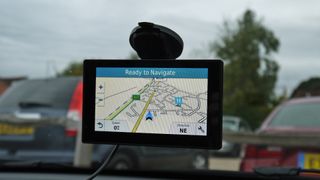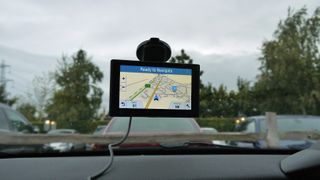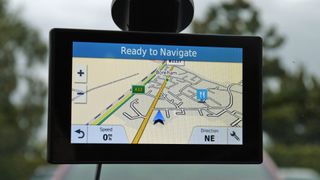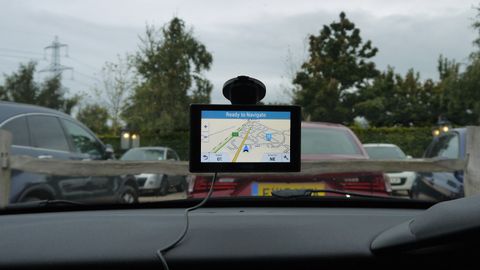TechRadar Verdict
If you want a dedicated sat nav that doesn't rely on your phone the Drive Assist 51 is an excellent choice. It's wide feature set, ease of use and simple docking means it's a great for those less tech savvy.
Pros
- +
Clear, responsive display
- +
Accurate visual and voice directions
- +
Dash cam integration is a nice feature
Cons
- -
Pricey
- -
Battery life only 30 minutes
- -
Stay on route commands unnecessary
Why you can trust TechRadar
The Garmin Drive Assist 51 offers up a range of features including live traffic and a dash cam in a compact package.
The sat nav market is in a strange place. As our smartphones continue to improve their free navigation offerings you get the feeling the traditional sat nav is slowly getting squeezed out.
It's forcing manufacturers of the traditional devices to find new ways of adding value to their standalone offerings, and the Drive Assist 51 certainly has a few neat features.
Design and display
- Compact, portable design
- 5-inch display is clear and responsive
At 140 x 84 x 21mm, the Drive Assist 51 is one of Garmin's smallest sat navs, and it makes it nice and portable.
It also means it doesn't take up too much space on your dash or windshield, giving you a better view of the road and makes the screen less distracting.
It comes with not one but two, micro SD card slots, with one already packing a 4GB memory card out of the box. This will be used to save recorded footage from the dash cam, so don't remove it.
One of the best bits of the design though is the docking cradle that holds it to your car. It's super easy to click on and off the suction cup mount, which means removing it from view at the end of your journey a simple, one handed job.
The 5-inch touchscreen display is bright, clear and responsive, making it easy to see your next navigation prompt and key journey stats such as time and distance remaining.
The 480 X 272 resolution won't particularly impress you, it's not even HD, but with large fonts and icons it's not much of an issue. It does make us question the price tag though, as you can buy a smartphone with a full HD display for less.
While the compact form factor and display will appeal to those who want something that's easily portable, 5 inches may not be big enough for those with poorer eyesight.
- For the best GPS devices around, head to our best sat nav guide.

Garmin does make larger size sat navs for those wanting a bigger screen, but the diminutive nature of the Drive Assist 51 means it'll slip easily into the back pocket of your jeans, not that we recommend you keep it there.
One disappointing feature of the Drive Assist 51 is its battery life, as it'll only last 30 minutes on a single charge.
That's pretty shocking, and means you'll pretty much have to have it plugged into your in-car power port for every journey.
It may not be a big issue, but it's frustrating that it can't last a few hours to get you through a whole journey before requiring a top up.
Interface and navigation
- Easy and quick to setup and use
- Navigation is excellent
We were impressed with the ease of setup on the Garmin Assist 51 with just a few short steps required to get you set up out of the box.
You will need to be in your car and connected to the power to do this as the battery life isn't great.
Once the initial setup is complete and you've got your Drive Assist 51 mounted you'll be invited to adjust the camera position to make sure it's pointing at the middle of the road ahead of you.
You get three options depending where on the windshield you've mounted it; left, middle and right; and once you've chosen you're ready to go.
The large icons in the menu make planning a route easy, and simply tapping in a postcode will see the Drive Assist 51 plot not one, but three viable routes.

It'll also use live traffic date (we reviewed the pricier model which offered this) to give you real time estimates of journey times.
You can opt to search for points of interest as your destination, which is handy if you know where you're going but don't have an address, and the map also shows useful things such as speed limits and cameras, petrol stations and locations of service stations and popular food chains such as McDonald's.
It also offers clear lane guidance, showing you exactly what lane you need to be in at busy junctions, which is extremely useful if you're driving somewhere unfamiliar.
One frustration with the navigation was regular 'stay on route/right’ commands as we traveled along the motorway. Instead of telling us we had 90 miles until we needed to leave the road, the Drive Assist 51 instead would say say much less and then tell us not to exit at a junction.
The commands felt redundant, and we'd much prefer to see the total mileage for the current motorway rather than getting it in chunks as we drive along.
Dash cam and extras
- Dash cam is useful, especially for safety conscious
- Offers forward collision and lane departure assists
The camera mounted on the rear of the Drive Assist 51 doesn't just have one function.
It can act as a dash cam, automatically recording and saving footage with exact GPS coordinates when it detects an impact, giving you evidence if you were to be involved in an accident to prove it wasn't your fault.
Footage can then be downloaded to your smartphone via the Garmin VIRB app, and from there you have the option to share it over various communication and social mediums.
There's more to it than that though, as it also provides forward collision and lane departure alerts.
What this means is the Drive Assist 51 will chirp a tone at you if you get too close to the car in front or to the edge of the lane you're in.
We found during our time with the Drive Assist 51 that the forward collision alert was smarter than the lane departure warning, but both work and help you keep your concentration on the road ahead.

Another feature of the camera is destination view. Once you near your destination (we're talking tens of yards away) the Drive Assist 51 will switch from the digital map view to a live feed from the camera with map details overlaid.
It's a simple augmented reality (AR) experience, but one which surprised and pleased us the first time we saw it.
You can even link your smartphone to the sat nav via Bluetooth, allowing you to make and receive phone calls safely, and hands free, from the Drive Assist 51, as well as seeing key notifications such as messages and calendar events.
Verdict
The Garmin Drive Assist 51 is a very good sat nav, with the added bonus of lifetime updates and traffic plus the inclusion of a dash cam, reducing the number of devices on your windshield.
That said, it still feels like a difficult sell to anyone who's proficient with their mobile and is happy to use that as their navigation tool.
Considering your smartphone offers free mapping and navigation via Apple Maps and Google Maps, it's quite a price to pay for the Drive Assist 51 which essentially does just one job versus a smartphone of the same price (or less!) that does much more.
However, with fewer tasks the Garmin Drive Assist 51 is laser focused on the navigation experience, and it's one that excels when you're behind the wheel. It's hard to say if it's better than your smartphone, they're very close, but it's certainly no worse.
Who's it for?
If you're looking for a dedicated sat nav that isn't still in Beta (we're looking at you Google and Apple), the Garmin Drive Assist 51 is an excellent choice, if you have the cash.
It's wide feature set, easy setup and use and simple docking mount means it's a great choice those the less tech savvy.
Should I buy it?
If you fall into the less tech savvy category, and/or don't fancy using your smartphone to direct you then the Drive Assist 51 won't disappoint.
It's not cheap, but you do at least get a decent amount of value for money.

John joined TechRadar over a decade ago as Staff Writer for Phones, and over the years has built up a vast knowledge of the tech industry. He's interviewed CEOs from some of the world's biggest tech firms, visited their HQs and has appeared on live TV and radio, including Sky News, BBC News, BBC World News, Al Jazeera, LBC and BBC Radio 4. Originally specializing in phones, tablets and wearables, John is now TechRadar's resident automotive expert, reviewing the latest and greatest EVs and PHEVs on the market. John also looks after the day-to-day running of the site.

